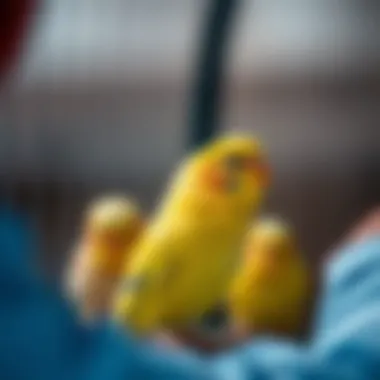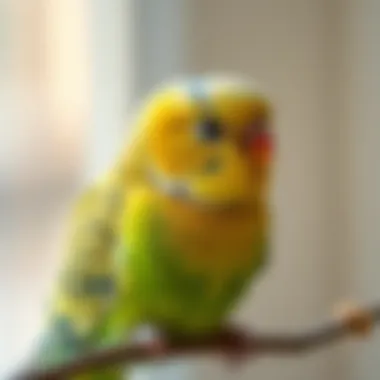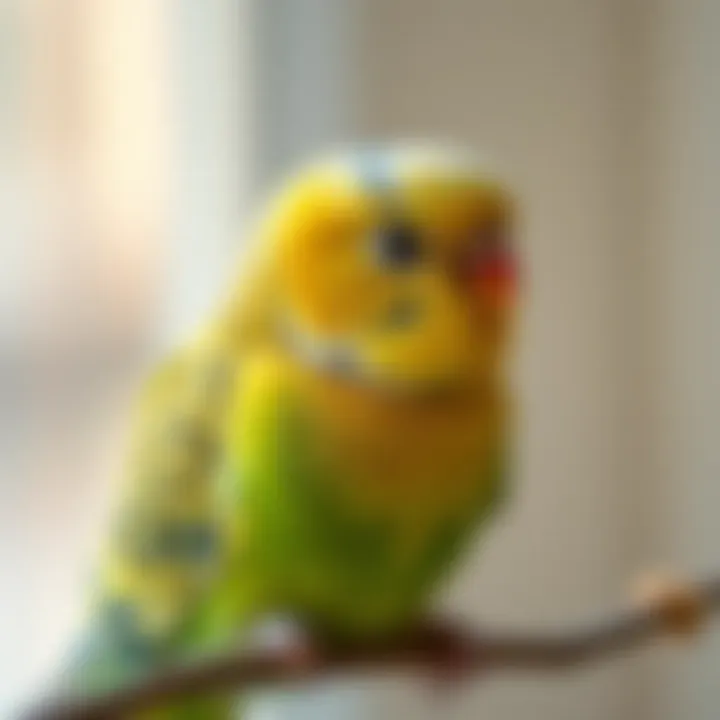Where to Buy a Canary Bird: A Comprehensive Guide


Intro
When someone decides to bring a canary into their life, it's often more than just a whim; it's a commitment. This little feathered friend can add joy, color, and, quite frankly, a delightful melody to any home. However, the journey to obtaining a canary involves more than simply picking one out from a store or online listing. It requires thoughtfulness about various factors that will affect both the bird’s happiness and the owner’s experience.
Those looking to purchase a canary may find themselves pondering questions like: Where do I buy this bird? How do I ensure I’m making a responsible choice? What care does a canary require? These points deserve careful consideration.
To guide aspiring canary owners, this article covers various avenues for acquiring these enchanting birds, including pet stores, breeders, rescue organizations, and online platforms. Furthermore, it will delve into the necessary basics such as housing, nutrition, and health management for these vibrant creatures. Understanding these factors positively impacts the overall experience of both the pet and the owner, fostering a long-lasting companionship filled with chirps, songs, and mutual admiration.
So, let’s delve deeper into essential aspects of avian care that prospective owners should be aware of before welcoming a canary into their homes.
Avian Care Basics
Purchasing a canary involves understanding the fundamental aspects of bird ownership. Although canaries are often regarded as easy-going pets, a solid foundation in avian care is crucial for fostering their well-being.
Importance of Proper Nutrition
Feeding a canary isn’t simply about pouring seeds into a dish. These birds thrive on a balanced diet, often requiring a mix of seeds, pellets, and fresh fruits or vegetables. It is vital for owners to ensure that their canaries receive a varied diet containing the necessary vitamins and minerals. Foods rich in Vitamin A, such as carrots and dark leafy greens, help support their immune systems and promote healthy feathers.
Understanding Bird Species and Their Needs
Canaries can vary widely in color and song, resulting in different preferences and needs. Some canaries are bred specifically for their singing abilities, while others are chosen for their strikingly vibrant colors. New bird owners should familiarize themselves with the specific type of canary they are interested in adopting to provide the best care tailored to that species.
Basics of Birds Habitat Setup
Creating an appropriate habitat for a canary is paramount. A spacious, clean cage with appropriate bar spacing is essential for their safety. Birds need space to fly and exercise, so a cage that accommodates perches, toys, and nesting materials is ideal. Additionally, ensuring proper ventilation and maintaining consistent temperatures in their habitat is essential for their health.
Grooming and Hygiene Tips
Regular grooming is not just for appearance; it's an essential part of a canary’s health regime. Owners should regularly check their birds' nails, feathers, and beaks. A clean bird is a happy bird. Bathing opportunities, whether through a shallow dish or a gentle mist with a spray bottle, help maintain feather health and keep them looking their best.
Important: Regular cleaning of the cage, along with removing uneaten food and waste, contributes to reducing the risk of illnesses.
By keeping these avian care basics in mind, potential canary owners can feel more prepared for welcoming a new feathered family member into their hearts and homes. The next steps in this guide will explore how to connect with their new pet, ensuring a fulfilling experience for both bird and owner.
Understanding the Canary Bird
Canary birds, with their vibrant colors and delightful songs, hold a special place not just in our homes but also in our hearts. Understanding these small finches is crucial, especially for potential owners who are about to take on the responsibility of rearing them. This section goes beyond the basic facts and dives into the essence of what makes canaries unique. It prepares you for ownership by exploring their rich history, types, and the traits that make them special.
Historical Background
The history of canaries dates back to the Canary Islands, where these birds were first discovered by Spanish sailors in the 15th century. Initially, they were prized for their beautiful singing and were often kept by nobility. Over the centuries, canaries became more than just pets; they became symbols of cultural importance. For example, the use of canaries in coal mines as a warning system is well-known; miners would bring these birds underground to detect toxic gases. When the canary stopped singing or showed signs of distress, it was a clear signal to evacuate the mine. This historical tidbit underscores the canary’s resilience and adaptability.
Types of Canaries
Canaries are not just one type; they come in various breeds, each with their own distinct attributes. Knowing the types available can help you choose the right one for your lifestyle and preferences.
Song Canaries
Song Canaries, as the name suggests, are celebrated for their captivating songs. The most well-known among them is the American Singer, characterized by its strong melody and variety in tone. This type of canary not only enchants with its singing but also showcases a wide range of vocal techniques. For those who appreciate music, a Song Canary can offer a constant serenade that brightens up any day. However, it's worth noting that they need regular interaction and stimulation to develop their singing capabilities to their fullest potential.
Colorbred Canaries
Colorbred Canaries attract bird owners who place a premium on aesthetics. These birds are bred for their striking colors, which can range from bright yellows to deep reds and even lavender. The achievement of color variability occurs through selective breeding, resulting in unique shades that catch the eye. Moreover, many owners are drawn to them for showcasing purposes at bird shows. However, it's essential to realize that the care requirements for Colorbred Canaries can include more meticulous attention to their diet to maintain their vibrant plumage.
Breed Characteristics
Understanding the breed characteristics of canaries is beneficial, especially if you're contemplating which species aligns with your lifestyle. For instance, some breeds are better suited to social interactions, while others prefer solitude. Canaries such as the Yorkshire or the Norwich are well-loved for their appearance and temperament. The Yorkshire is tall and elegant, whereas the Norwich has a more robust body shape. These physical traits influence not just aesthetic appeal but also personality and care considerations, offering potential owners a range of choices to suit their preferences.
In summary, grasping the intricacies of canaries significantly enhances the experience for pet owners. From their interesting backstory to the distinct types available, this knowledge equips enthusiasts to make informed choices. Whether you’re after a singing companion or a colorful display bird, having a solid foundation on canary characteristics is indispensable.
Factors to Consider Before Buying a Canary
Buying a canary is more than just picking a pretty bird; it's a commitment that requires thorough consideration. Knowing what to anticipate helps prospective owners make better decisions. This section highlights critical elements like financial aspects and ongoing care, ensuring future bird parents are well-prepared.
Budget and Initial Costs
Purchase Price
When it comes to the purchase price, expect a range of costs based on factors like breed and age. Generally, the price can vary significantly—common canaries often fall between $25 to $150, while rarer breeds can easily escalate to several hundred dollars. Budgeting for this expense is essential. A hefty price tag doesn't always mean top quality; therefore, consider what you are getting for your money, including health guarantees or lineage. Understanding these pricing dynamics allows buyers to compare options effectively, ensuring they make a cost-efficient choice.
Setup Costs
Setting up your canary's new home incurs additional setup costs, which may include a cage, perches, toys, and food or feeders. These costs can add up quickly, with a decent cage starting at around $50 and accessories potentially doubling that. A well-planned setup isn’t just for aesthetics; it plays a vital role in your bird’s well-being. Investing in safe and spacious equipment is beneficial for the bird's health and offers better opportunities for socialization. Neglecting this area could lead to unforeseen expenses later, as canaries thrive in environments that mimic their natural habitat.
Commitment to Care
Feeding Requirements
Feeding a canary isn't just tossing seeds into a bowl. Feeding requirements include a balanced diet composed of high-quality seeds, pellets, and supplementary foods like fruits or vegetables. A varied diet not only enhances their health but also ensures they remain active and chirpy. It's crucial to note that while seeds are popular, an over-reliance on them can lead to nutritional imbalances. Thus, buyers should familiarize themselves with appropriate meal plans to promote longer, healthier lives for their new feathered friends.
Space Considerations
Every canary deserves their space. Space considerations extend beyond the cage size; adequate room allows your bird to stretch its wings and interact. An ideal cage should provide ample space for fluttering and socializing while accommodating necessary accessories. It's a misconception that smaller cages work just fine. On the contrary, cramped quarters can lead to stress or health issues. Thus, measuring the designated area for a canary's home ahead of time will save future headaches and offer your bird the comfort it deserves.
"An informed owner leads to a happy bird."


By understanding the financial implications and care commitments of owning a canary, prospective buyers set the stage for a more satisfying ownership experience.
Local Pet Stores as a Source
When it comes to purchasing a canary bird, local pet stores can play an important role in the equation. They often serve as the initial point of contact for many potential bird owners. Unlike online options where you only see images, local stores give you a real, tangible opportunity to interact with the canaries you might desire. This hands-on experience is invaluable, particularly for first-time buyers who may be unfamiliar with bird behavior or health signs. Understanding how to navigate local pet stores can enhance your overall buying experience.
Evaluating Local Stores
Reputation and Reviews
The reputation of a local pet store speaks volumes about its quality and the care it provides to its animals. Reviews, often found online through platforms such as Google or social media pages, are a goldmine of information. Reading what others have to say can shed light on the experiences of previous buyers. Positive reviews usually indicate that the store takes good care of its birds, ensuring healthy living conditions, which can be crucial when you plan to welcome a canary into your home.
Moreover, a store's longevity in the community is often a sign it has earned trust. An established business is likely to have built relationships with suppliers and veterinarians, which might reflect in how they care for their avian charges. Look for stores that regularly engage with customers and maintain a solid reputation in local forums.
"Healthy birds make for happy owners. Always check reviews before committing to a purchase!"
Health and Condition of Birds
Just as vital as reputation, the health and condition of the birds in a local pet store should be a major consideration. You shouldn't just take a bird home without first assessing its health. Active birds, clear eyes, and clean feathers are all strong indicators of well-cared-for canaries. In a local store, you get the chance to observe these details firsthand.
Additionally, don't hesitate to ask about the sources of their canaries. A trustworthy store will be transparent and can share where they acquire their birds, whether from reputable breeders or local rescues. Being informed about their history can give you peace of mind regarding the health and behavior of your new feathered companion.
Benefits of Buying Locally
Instant Ownership
One of the most attractive aspects of buying from local pet stores is instant ownership. This means you can take your new canary home the same day, a thrilling prospect for any new owner. While it might be tempting to browse online and wait for shipping, nothing quite compares to the immediacy of picking out your bird, securing a cage, and heading back to create a cozy environment.
This immediate satisfaction can also foster a deeper bond from day one. After all, you can start the acclimatization process right away, getting your canary settled and accustomed to its new home without delay.
Immediate Support and Guidance
Buying locally often comes with the added benefit of immediate support and guidance. Staff members at local pet stores typically have more direct experience with the animals they sell. They can provide quality advice on care, diet, and handling. This information can be essential for someone new to bird ownership, minimizing the learning curve.
Plus, if you encounter any issues after the purchase, a local store is much easier to go back to for help than contacting an online seller. Establishing a relationship with store employees can lead to a wealth of ongoing knowledge about your canary's needs. Creating a support network right from the get-go puts you in a much better position for success in your new role as a bird owner.
Local pet stores, while not without their quirks and variations, can offer unique benefits that resonate with both first-time buyers and seasoned bird enthusiasts alike. Whether through the physical assessment of the bird’s health or the chance to receive immediate advice, local businesses are a standout option when considering where to buy your future companion.
Working with Breeders
When it comes to acquiring a canary, working with reputable breeders can offer a wealth of advantages. Not only do breeders typically have a deeper understanding of the birds they raise, but they also provide insights that are invaluable for new pet owners. Unlike purchasing from a pet store, where a bird's history may be unclear, breeders can offer detailed information about the lineage, habits, and requirements of their birds. Moreover, engaging with breeders can improve your chances of finding a canary that perfectly fits your needs, whether you’re after remarkable singing abilities or vibrant colors.
Finding Reputable Breeders
Questions to Ask
The initial step in your search should be asking the right questions. Questions like "What is the diet of these birds?" or "Can you show me the parents?" can reveal a lot about the breeder’s practices. This also gives you a chance to gauge their passion for the birds. A helpful breeder is not just selling you a canary; they’re also willing to educate you on proper care and maintenance.
One useful aspect of this is that it helps you feel comfortable in your choice - when you know the answers to your questions, it’s easier to make a well-informed decision. An important characteristic of such inquiries is that they allow you to assess the breeder's commitment to their birds. Selecting a breeder who is open and transparent also lowers risks in the long run.
Evaluating Breeder Conditions
Another key aspect is evaluating the conditions where the canaries are bred. Are the cages spacious and clean? Is there good ventilation? Proper breeding conditions contribute significantly to the health and temperament of the birds. An ideal breeder keeps their canaries in an environment that is not just safe but also nurturing, allowing the birds to thrive.
Paying attention to these conditions allows potential buyers to differentiate between quality sources of canaries and those who prioritize profit over animal welfare. A notable feature here is that good conditions often lead to healthier birds that are less likely to develop issues later on, which is a benefit you certainly want to consider.
Advantages of Buying from Breeders
Choosing to buy from breeders offers distinct advantages that other sources may not. Those advantages include the increased genetic diversity and generally healthier birds. Breeders often focus on maintaining the genetic pool, which can yield birds that are not only beautiful but also hardy. With careful selection, they minimize inbreeding, which can lead to various health concerns.
Genetic Diversity
A standout aspect of genetic diversity when buying from breeders is that you’re accessing a wider variety of canary types. This is not just about colors; it's also about temperament and adaptability. Breeders can offer choices that are better suited to your lifestyle or preferences.
This genetic diversity means that these birds often have a better chance at a longer, healthier life. Therefore, you’re not just investing in a pet; you’re also investing in its wellbeing. The unique feature here lies in the fact that varied genetics can lead to a more resilient bird, which is always a plus for any owner.
Better Health Guarantees
Purchasing from breeders also often comes with better health guarantees. Many reputable breeders will provide a health guarantee or a return policy in case the bird falls ill soon after purchase. This is a crucial consideration for potential canary owners who want peace of mind.
An important point about health guarantees is that they show a breeder’s confidence in their birds. This type of assurance is valuable; it indicates that the breeder is committed to both the birds and their new owners. The potential downside might be the initial costs, as breeders often charge a premium compared to pet stores. However, considering the long-term benefits, this investment tends to be well worth it.
"Buying from a breeder is not just a transaction; it’s a partnership in caring for a beautiful creature."
Rescue Organizations and Adoption
In the realm of becoming a canary owner, one often overlooks a heartwarming avenue: adoption through rescue organizations. These organizations dedicate themselves to finding homes for birds that might otherwise struggle to thrive. By choosing to adopt, potential owners are not just acquiring a pet; they're offering a second chance at life for these vibrant creatures. This section provides insights into the value of rescue organizations and the benefits of adopting a canary, which can lead to a fulfilling companionship.
Understanding Avian Rescue
Avian rescue organizations focus on rehabilitating and rehoming birds that have been surrendered, abandoned, or found in distressing conditions. Often, these birds come with unique stories, some having been mistreated in previous environments. Engaging with these organizations means you're potentially saving a bird from a tough situation. Additionally, adopting from a rescue can often be less expensive than buying from a breeder or pet store, as many organizations charge a nominal adoption fee that usually includes initial care and vaccinations.
Adopting from a rescue often brings unexpected rewards, both emotionally and in terms of the bond that develops. Many birds up for adoption are already socialized, meaning they may adapt to a new home more easily. However, it is critical to assess the specific needs of each individual bird, as some may require more patience during the transition. Through rescue organizations, prospective owners can receive advice on how to care for their new feathered friend, making the journey smoother.
The Adoption Process


Engaging in the adoption process can seem daunting, but it doesn't need to be. Understanding the structured flow of adopting a canary can ease apprehension and ensure that both the bird and the new owner are well-prepared for a successful companionship.
Application Procedures
The application procedures involved in adopting a canary are key to ensuring a good match between potential owners and the birds. This process typically requires filling out a detailed application form where interested adopters share information about their living situation, experience with birds, and expectations.
This step serves several crucial purposes: it helps the rescue organization gauge whether the applicant's home is suitable for a canary, and it also encourages adopters to reflect on what they can offer to a new pet. Moreover, the questions posed can illuminate any gaps in knowledge potential owners may have about canary care. This reflective process makes it a beneficial choice for all parties involved, as it fosters responsible bird ownership from the start.
However, it’s important to note that some may find the detailed questions overwhelming. Despite this, the thoroughness not only protects the birds but also improves the chances of a long-term match between the new owner and the pet.
Home Checks
After successfully navigating the application procedures, a home check is often the next step in the adoption process. This visit is used to assess the applicant's home environment, ensuring it's suitable for a canary. The purpose is clear: the organization wants to guarantee the canary's safety and well-being.
During the home check, a representative from the rescue will evaluate aspects such as cage placement, overall space, and potential hazards. By visiting the home, organizations can provide tailored advice on how to optimize the environment further—an added benefit to adopting through rescue.
While some might view this step as invasive, it underscores the commitment of rescue organizations to the welfare of the birds. Facilitating the best possible living conditions is a top priority. On the flip side, the process can feel like an additional hurdle compared to simply purchasing a bird without checks. In the end, these measures are put in place for good reasons.
Ultimately, addressing both application procedures and home checks ensures that when adopting a canary, the process aims to create a lifelong, happy home for both bird and owner, cementing a commitment to responsible pet ownership.
Online Platforms for Purchasing Canaries
In today’s digital era, online platforms serve as a crucial avenue for those looking to buy canaries. This section explores various elements of online buying, including potential benefits and essential considerations, to help you make informed decisions in your quest for a feathery companion.
Evaluating Online Sellers
Reputation and Trustworthiness
When diving into the realm of online sellers, reputation is a heavyweight factor that deserves your utmost attention. A seller’s standing can heavily influence your buying experience. It's wise to check reviews and feedback from previous customers, as these comments often tell a tale. Look for brick-and-mortar stores with an online presence, or specialized avian websites. Such sellers are typically underwater in the bird care community and offer a added layer of assurance.
A key characteristic of trustworthy sellers is their transparency. They might provide detailed information about the birds, including their lineage and health checks. This can be beneficial since it reduces the chances of unpleasant surprises post-purchase. Unique to this reputation is the ease of contacting them directly for any inquiries, which can offer you peace of mind.
However, the internet does come with its fair share of sketchy sellers too, so it’s all about doing your homework. Protecting yourself means understanding and identifying reputable sellers before making any financial commitments.
Shipping Considerations
Shipping is yet another cog in the wheel of purchasing canaries online. It’s not just about sending the bird from point A to point B. Considerations here include how the seller packages the bird, the time it takes for the delivery, and whether they provide tracking information. The welfare of the bird during transit is paramount, so look for sellers that use appropriate carriers and have solid shipping policies in favor of the birds’ safety.
A significant advantage of purchasing online is that it opens doors to breeders and sources you might not find locally. However, the downside can be the potential stress placed on the bird during transit. Delays or issues in shipment can occur, affecting the animal's well-being.
Popular Websites for Bird Sales
Specialized Aviary Websites
Specialized aviary websites stand out by targeting the niche of bird enthusiasts. These platforms focus solely on avian companions, often offering a wide array of breeds, including canaries. The key characteristic here is their expertise — many sellers on these sites are seasoned breeders. When perusing these listings, you’re more likely to find well-bred birds that meet the specific qualities you desire.
The unique advantage of these websites lies in their resources. Many have forums or blogs associated with them, providing valuable information on care, breeding practices, and transitioning a new bird into your home. If you're looking for social aspects, these communities can offer unparalleled insights. Additionally, purchases here often lead to healthier options, since reputable breeders prioritize the well-being of their birds.
However, one drawback could be the limited geographic scope; not all birds listed may be available in your area. It’s also essential to cross-reference any specific seller's reputations outside of their listings to ensure they uphold their part of the bargain.
Classified Ads
Classified ads might seem old-school, but they remain a powerhouse for finding a canary, particularly if you're open to various breeds or looking for a good deal. Here, the beauty lies in the personal touch; you can connect directly with sellers and often negotiate prices. Many people feel more comfortable making a connection outside of a corporate framework.
What makes classified ads appealing is the local nature of many listings. You might discover individuals looking to rehome birds for various reasons. This can lead to saving a bird in need of a caring home. However, it's crucial to meet sellers in safe environments and observe the birds in person when possible.
While using classified ads can yield favorable outcomes, the challenge surfaces in the realm of vetting sellers. Unlike reputable online platforms, classified options may not have a sturdy safety net. Therefore, you’ll need to be vigilant about verifying information and ensuring the health and history of the bird you're considering.
In summary, whether opting for specialized sites or browsing classified ads, each online avenue presents its own set of pros and cons, necessitating careful evaluation to fulfill your needs as a prospective canary owner.
These several options to explore online mean that the road to finding your ideal canary is wider than you might think — just keep an eye out for those crucial factors that can make or break your buying experience.
Post-Purchase Considerations
Once you've navigated the journey of acquiring a canary, a new chapter begins with post-purchase considerations. It's crucial to understand that obtaining a bird is just the first step; creating a supportive environment and ensuring its health and well-being are equally vital.
The role of setting up a proper environment cannot be overstated. Canaries need a home that feels safe and encourages their natural behaviors. A well-thought-out cage, along with quality accessories, plays a pivotal part in this process.
Setting Up a Proper Environment
Cage Requirements
The cage is the centerpiece of your canary's habitat. It should be spacious enough to allow for movement. A popular choice among bird owners is a rectangular cage, which provides ample flight space and easy interior management. Ideally, look for one that measures at least 24 inches long and 18 inches wide, accommodating toys and perches.
Key Characteristics:
- Wired Design: Allows for ventilation and visibility.
- Easy Access: Doors should be large for easy access during feeding or cleaning.
A unique feature worth noting is bar spacing; it should be narrow enough to prevent the bird from escaping or getting stuck, yet wide enough for movement. While more vertical cages might seem appealing, they often limit the canary's ability to fly freely, making a horizontal design a better fit.
Essential Accessories
Beyond the cage itself, essential accessories enhance the canary's quality of life. These include perches of varying thickness for foot exercise, bathing stations, and toys to stimulate mental engagement. Opting for natural wood perches is beneficial—they mimic the canary's natural environment and promote foot health.
Key Characteristics:


- Diverse Perch Options: Rubber or textured surfaces can assist in maintaining foot health, offering different gripping textures for exercise.
What's unique about these accessories is their contribution to both physical health and mental stimulation. However, it's essential to ensure that all materials are safe, since some plastics can be harmful if chewed on.
Initial Health Checks
Regular health checks are essential to maintaining your new pet's well-being. Right after bringing your canary home, scheduling a veterinary visit is highly recommended. This step helps in establishing a health baseline and can uncover any pre-existing issues.
Veterinary Visits
Engaging with a vet familiar with avian care is paramount. An initial examination could cover aspects like feather quality, weight, and general demeanor. Moreover, getting advice on vaccinations and dietary needs tailored to your canary can set the tone for a healthy life ahead.
Key Characteristics:
- Expert Guidance: A vet’s insight is crucial for preventative care and monitoring health.
One advantage of regular check-ups is the capacity to catch health problems early, which is often less expensive and more manageable than dealing with a significant illness after it develops.
Understanding Common Health Issues
Another critical element is being educated about common health issues that can affect canaries. Birds can show symptoms of illness in subtle ways, making knowledge about their typical behaviors essential for new owners.
Key Characteristics:
- Awareness of Symptoms: Typical signs involve changes in singing, loss of weight, and alterations in droppings.
Understanding health trends allows owners to act swiftly if something seems off. Moreover, this knowledge fosters a deeper connection with your canary, emphasizing the practice of observing their daily behavior.
In summary, post-purchase considerations are not merely administrative tasks; they are foundational for cultivating a harmonious and fulfilling relationship with your new feathered friend. Rounding up essentials in both environments and health checks truly sets the stage for a rewarding ownership experience.
Educating Yourself on Canary Care
Understanding how to care for a canary is paramount for any prospective bird owner. Beyond merely adorning your home with these vibrant little creatures, recognition of their unique needs fosters a nurturing environment conducive to their well-being. This section delves into dietary beeds and social habits, laying the foundation for a fulfilling relationship between you and your canary.
Dietary Needs
Seed vs. Pellet Diets
When it comes to feeding canaries, the age-old debate of seed versus pellets is a focal point. Seeds provide the immediate allure of natural foraging, mimicking the canary's wild diet. However, they can lack crucial nutrients if they're not properly supplemented. On the flip side, pellets are formulated to offer a balanced diet that meets all the essential vitamins and minerals. Many experts suggest a mixed approach, incorporating both for a well-rounded diet. This combination allows for the joy of foraging while ensuring nutritional adequacy.
Key Characteristics of Seed Diet:
- Varied selection, including millet, canary grass seed, and oats.
- Encourages natural foraging behavior.
Benefits of Seed Diet:
- Engaging and stimulating for the bird.
- Familiarity akin to their natural habitat.
However, it's crucial to monitor weight, as seed-heavy diets can lead to obesity.
Supplementary Foods
Supplementary foods are a boon to your canary's health. Think of fresh fruits, vegetables, and certain grains as nature's vitamins. They add variety to the diet and can help prevent boredom. Apples, carrots, and even dandelion leaves can be enticing for your feathered friend and enrich their nutritional intake.
Key Characteristics of Supplementary Foods:
- Fresh and packed with vitamins.
- Enhances overall diet.
Advantages:
- Reduces the risk of nutritional deficiencies.
- Keeps feeding routine interesting and engaging.
Nevertheless, moderation is essential, as too many treats can lead to digestive issues.
Behavior and Socialization
Recognizing Signs of Stress
Understanding stress signals in canaries alleviates suffering and paves the way for a happier pet. Birds may exhibit various behaviors indicating discomfort, such as excessive vocalization, feather plucking, or a sudden change in their eating habits. Recognizing these signs early can make a significant difference in their health.
Key Characteristics of Stress Signals:
- Changes in vocalizations, which may become more frantic.
- Altered body language, like puffing up feathers or hiding.
Benefit:
- Early identification can lead to quick actions that resolve their distress, ultimately leading to a more stable home environment.
Encouraging Interaction
Interaction is vital for canaries. They are social birds thriving on companionship, whether that means spending time with humans or other birds. Regular engagement through talking, whistling, or simply being nearby can foster a strong bond.
Key Characteristics of Interaction:
- Encourages instinctual behaviors.
- Increases the bird’s comfort level in your presence.
Benefit:
- A well-socialized bird is less likely to experience loneliness or anxiety, leading to a happier living experience for both you and your canary.
In summary, educating yourself on canary care is an investment that yields rewarding dividends. By understanding dietary needs and social behaviors, you create a nurturing atmosphere that could change a canary's life, making your ownership journey worthwhile.















